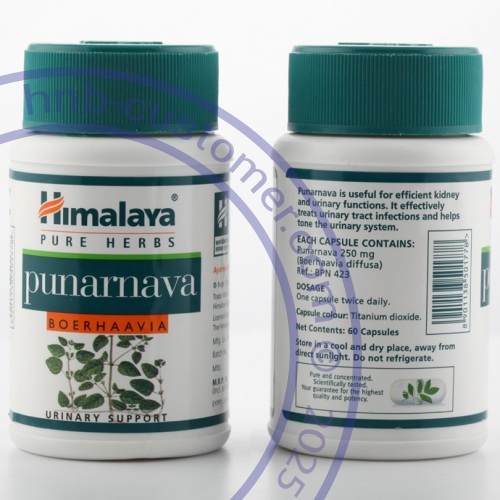Punarnava bottle
What is this herbal medicine?
The entire PUNARNAVA plant (Spreading Hogweed/Boerhavia diffusa), including the root and leaves, is known to have medicinal properties. It has long been used by indigenous and tribal people in India. The medicinal value of this plant in the treatment of a large number of ailments is mentioned in Ayurveda’s prime text, the Charaka Samhita. Punarnava has many ethnobotanical uses. The leaves are eaten as a vegetable. The root juice is used to treat asthma, urinary disorders, leukorrhea, rheumatism and encephalitis. In addition, the plant has many pharmacological, clinical and antimicrobial properties. The plant is a weed that is found all across India.
Active constituents
The plant contains punarnavoside, rotenoids, boeravinones A, B, C, D and E, lignans, flavones and sterols. Punarnavoside is reported to have diuretic, anti-inflammatory, antifibrinolytic and antibacterial properties. Of the two lignans liriodendrin and syringaresinol mono-β-D-glucoside found in the root extract of Punarnava, liriodendrin has a significant calcium channel blocking effect. Calcium channel antagonists or calcium channel blockers are drugs which relax the smooth muscle cells, thereby reducing muscle spasms. They relax blood vessels and lower blood pressure, which is useful in the treatment of cardiovascular disorders. The rotenoid constituents have been studied for their spasmolytic activity on the gastrointestinal tract. Researchers have reported that the plant extract contains potassium nitrate, in addition to punarnavine. It has been reported that the plant extract contains ursolic acid. The shoot contains 15 amino acids including six essential amino acids, and the root system contains 14 amino acids including seven essential amino acids.
Herb functions:
- Urinary tract infection: Punarnava works as a diuretic. The diuretic action of the herb is attributed to the presence of the xanthone beta-ecdysone. In addition, Punarnava also has antimicrobial, anti-inflammatory and antispasmodic properties, which are beneficial in treating urinary tract disorders such as chronic and recurrent urinary tract infections (UTIs), including UTIs in pregnancy.
- Nephrotic syndrome: The herb has been reported to increase serum protein levels and reduce urinary protein excretion in clinical trials in patients suffering with nephrotic syndrome. The activity is attributed to the presence of rotenoids in various parts of the plant. Punarnava also reduces edema associated with kidney dysfunction.
- Other: The flavonoid arbinofuranoside, present in the herb, was found to lower serum uric acid, which is helpful in treating urogenital disorders.
Indications:
- Urinary tract infections
- Edema (swelling)
Contraindications:
None
Recommended dose:
One capsule, twice a day or as directed by your physician
Composition
Each capsule contains 250mg extract of Punarnava
Note: The information on this page is not intended to be a substitute for professional medical advice. Do not use this information to diagnose or treat your problem without consulting your doctor.





